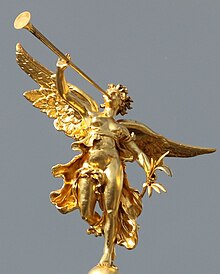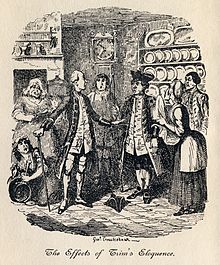
Giovanni Boccaccio was an Italian writer, poet, correspondent of Petrarch, and an important Renaissance humanist. Born in the town of Certaldo, he became so well known as a writer that he was sometimes simply known as "the Certaldese" and one of the most important figures in the European literary panorama of the fourteenth century. Some scholars define him as the greatest European prose writer of his time, a versatile writer who amalgamated different literary trends and genres, making them converge in original works, thanks to a creative activity exercised under the banner of experimentalism.

Neo-Latin is the style of written Latin used in original literary, scholarly, and scientific works, first in Italy during the Italian Renaissance of the fourteenth and fifteenth centuries, and then across northern Europe after about 1500, as a key feature of the humanist movement. Through comparison with Latin of the Classical period, scholars from Petrarch onwards promoted a standard of Latin closer to that of the ancient Romans, especially in grammar, style, and spelling. The term Neo-Latin was however coined much later, probably in Germany in the late 1700s, as Neulatein, spreading to French and other languages in the nineteenth century.

Francesco Petrarca, commonly anglicized as Petrarch, was a scholar and poet of the early Italian Renaissance, and one of the earliest humanists.

Public speaking, also called oratory, is the act or skill of delivering speeches on a subject before a live audience.

Rhetoric is the art of persuasion. It is one of the three ancient arts of discourse (trivium) along with grammar and logic/dialectic. As an academic discipline within the humanities, rhetoric aims to study the techniques that speakers or writers use to inform, persuade, and motivate their audiences. Rhetoric also provides heuristics for understanding, discovering, and developing arguments for particular situations.

Marcus Fabius Quintilianus was a Roman educator and rhetorician born in Hispania, widely referred to in medieval schools of rhetoric and in Renaissance writing. In English translation, he is usually referred to as Quintilian, although the alternate spellings of Quintillian and Quinctilian are occasionally seen, the latter in older texts.

Renaissance humanism was a worldview centered on the nature and importance of humanity, that emerged from the study of Classical antiquity. This first began in Italy and then spread across Western Europe in the 14th, 15th, and 16th centuries. During the period, the term humanist referred to teachers and students of the humanities, known as the studia humanitatis, which included the study of Latin and Ancient Greek literatures, grammar, rhetoric, history, poetry, and moral philosophy. It was not until the 19th century that this began to be called humanism instead of the original humanities, and later by the retronym Renaissance humanism to distinguish it from later humanist developments. During the Renaissance period most humanists were Christians, so their concern was to "purify and renew Christianity", not to do away with it. Their vision was to return ad fontes to the simplicity of the Gospels and of the New Testament, bypassing the complexities of medieval Christian theology.

On the Sublime is a Roman-era Greek work of literary criticism dated to the 1st century C.E. Its author is unknown, but is conventionally referred to as Longinus or Pseudo-Longinus. It is regarded as a classic work on aesthetics and the effects of good writing. The treatise highlights examples of good and bad writing from the previous millennium, focusing particularly on what may lead to the sublime.

Elocution is the study of formal speaking in pronunciation, grammar, style, and tone as well as the idea and practice of effective speech and its forms. It stems from the idea that while communication is symbolic, sounds are final and compelling.

In religious studies, homiletics is the application of the general principles of rhetoric to the specific art of public preaching. One who practices or studies homiletics may be called a homilist, or more simply, a preacher.
Pathos appeals to the emotions and ideals of the audience and elicits feelings that already reside in them. Pathos is a term used most often in rhetoric, as well as in literature, film and other narrative art.

Elocutio is a Latin term for the mastery of rhetorical devices and figures of speech in Western classical rhetoric. Elocutio or style is the third of the five canons of classical rhetoric that concern the craft and delivery of speeches and writing.

Pronuntiatio was the discipline of delivering speeches in Western classical rhetoric. It is one of the five canons of classical rhetoric that concern the crafting and delivery of speeches. In literature the equivalent of ancient pronuntiatio is the recitation of epics.

Italian literature is written in the Italian language, particularly within Italy. It may also refer to literature written by Italians or in other languages spoken in Italy, often languages that are closely related to modern Italian, including regional varieties and vernacular dialects.

The term composition as it refers to writing, can describe authors' decisions about, processes for designing, and sometimes the final product of, a composed linguistic work. In original use, it tended to describe practices concerning the development of oratorical performances, and eventually essays, narratives, or genres of imaginative literature, but since the mid-20th century emergence of the field of composition studies, its use has broadened to apply to any composed work: print or digital, alphanumeric or multimodal. As such, the composition of linguistic works goes beyond the exclusivity of written and oral documents to visual and digital arenas.
Saj‘ is a form of rhymed prose in Persian literature and also Arabic literature. It is named so because of its evenness or monotony, or from a fancied resemblance between its rhythm and the cooing of a dove. Characterized by a kind of rhythm as well as rhyme, it can engender either a highly artificial or a powerfully resonant style. Saj‘ is used in sacred literature, including parts of the Quran, and in secular literature, such as the One Thousand and One Nights.

Owing to its origin in ancient Greece and Rome, English rhetorical theory frequently employs Greek and Latin words as terms of art. This page explains commonly used rhetorical terms in alphabetical order. The brief definitions here are intended to serve as a quick reference rather than an in-depth discussion. For more information, click the terms.

De Oratore is a dialogue written by Cicero in 55 BC. It is set in 91 BC, when Lucius Licinius Crassus dies, just before the Social War and the civil war between Marius and Sulla, during which Marcus Antonius (orator), the other great orator of this dialogue, dies. During this year, the author faces a difficult political situation: after his return from exile in Dyrrachium, his house was destroyed by the gangs of Clodius in a time when violence was common. This was intertwined with the street politics of Rome.
Robert Tarbell Oliver was an American writer, lecturer, and an authority on public speaking, argumentation and debate, and Asian rhetorical traditions.

Eloquentia perfecta, a tradition of the Society of Jesus, is a value of Jesuit rhetoric that revolves around cultivating a person as a whole, as one learns to speak and write for the common good. Eloquentia perfecta is a Latin term which means "perfect eloquence". The term connotes values of eloquent expression and action for the common good. For Jesuits, the term eloquentia perfecta was understood as the joining of knowledge and wisdom with virtue and morality.













